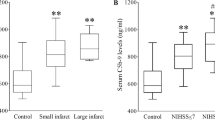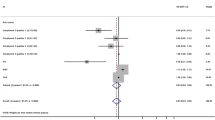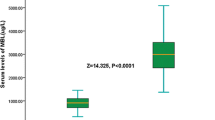Abstract
Previous studies demonstrated that diabetic stroke patients had a poor prognosis and excess complement system activation in the peripheral blood. In this study, the association of serum complement levels with the prognosis of diabetic stroke was examined. Patients with acute ischemic stroke were recruited and were divided into two groups according to their history of diabetes. Baseline data on the admission, including C3 and C4 were collected. Neurologic function at discharge was the primary outcome and was quantified by the National Institutes of Health Stroke Scale (NIHSS). A total of 426 patients with acute ischemic stroke (116 diabetic strokes and 310 non-diabetic strokes) were recruited in this study. There were significant differences between the two groups in hypertension, coronary disease, triglyceride, high-density lipoprotein cholesterol, fasting blood sugar, C4, and mortality rates. Furthermore, the values of complement protein levels were divided into tertiles. In the diabetic stroke group, serum C4 level at the acute phase in the upper third was independently associated with NIHSS score at discharge and concurrent infection. These associations were not significant in non-diabetic stroke. High serum C4 level at admission, as a unique significant predictor, was associated with unfavorable clinical outcomes in the diabetic stroke, independently of traditional risk factors.

Similar content being viewed by others
Data availability
Original data of the present study are available from the corresponding author upon reasonable request.
References
Alawieh A, Elvington A, Tomlinson S (2015a) Complement in the Homeostatic and Ischemic Brain. Front Immunol 6:417. https://doi.org/10.3389/fimmu.2015.00417
Alawieh A, Elvington A, Zhu H, Yu J, Kindy MS, Atkinson C, Tomlinson S (2015b) Modulation of post-stroke degenerative and regenerative processes and subacute protection by site-targeted inhibition of the alternative pathway of complement. J Neuroinflammation 12:247. https://doi.org/10.1186/s12974-015-0464-8
Bao X, Borne Y, Johnson L, Muhammad IF, Persson M, Niu K, Engstrom G (2018) Comparing the inflammatory profiles for incidence of diabetes mellitus and cardiovascular diseases: a prospective study exploring the “common soil” hypothesis. Cardiovasc Diabetol 17:87. https://doi.org/10.1186/s12933-018-0733-9
Borne Y et al (2017) Complement C3 associates with incidence of diabetes, but no evidence of a causal relationship. J Clin Endocrinol Metab 102:4477–4485. https://doi.org/10.1210/jc.2017-00948
Carpanini SM, Torvell M, Morgan BP (2019) Therapeutic inhibition of the complement system in diseases of the central nervous system. Front Immunol 10:362. https://doi.org/10.3389/fimmu.2019.00362
Cavusoglu E et al (2007) Usefulness of the serum complement component C4 as a predictor of stroke in patients with known or suspected coronary artery disease referred for coronary angiography. Am J Cardiol 100:164–168. https://doi.org/10.1016/j.amjcard.2007.02.075
Cervera A et al (2010) Genetically-defined deficiency of mannose-binding lectin is associated with protection after experimental stroke in mice and outcome in human stroke. PLoS ONE 5:e8433. https://doi.org/10.1371/journal.pone.0008433
Cojocaru IM et al (2008) Changes in plasma levels of complement in patients with acute ischemic stroke. Rom J Intern Med 46:77–80
Copenhaver M, Yu CY, Hoffman RP (2019) Complement components, C3 and C4, and the metabolic syndrome. Curr Diabetes Rev 15:44–48. https://doi.org/10.2174/1573399814666180417122030
Engstrom G, Hedblad B, Eriksson KF, Janzon L, Lindgarde F (2005) Complement C3 is a risk factor for the development of diabetes: a population-based cohort study. Diabetes 54:570–575. https://doi.org/10.2337/diabetes.54.2.570
Engstrom G, Hedblad B, Janzon L, Lindgarde F (2007) Complement C3 and C4 in plasma and incidence of myocardial infarction and stroke: a population-based cohort study. Eur J Cardiovasc Prev Rehabil 14:392–397. https://doi.org/10.1097/01.hjr.0000244582.30421.b2
Forti P, Maioli F, Nativio V, Maestri L, Coveri M, Zoli M (2020) Association of prestroke glycemic status with stroke mortality. BMJ Open Diabetes Res Care 8(1):e000957. https://doi.org/10.1136/bmjdrc-2019-000957
Ghebrehiwet B (2016) The complement system: an evolution in progress. F1000Res 5:2840. https://doi.org/10.12688/f1000research.10065.1
Hammad A, Westacott L, Zaben M (2018) The role of the complement system in traumatic brain injury: a review. J Neuroinflammation 15:24. https://doi.org/10.1186/s12974-018-1066-z
Lau LH, Lew J, Borschmann K, Thijs V, Ekinci EI (2019) Prevalence of diabetes and its effects on stroke outcomes: a meta-analysis and literature review. J Diabetes Investig 10:780–792. https://doi.org/10.1111/jdi.12932
Li W, Huang E, Gao S (2017) Type 1 diabetes mellitus and cognitive impairments: a systematic review. J Alzheimers Dis 57:29–36. https://doi.org/10.3233/JAD-161250
Lin Z, Lin H, Li W, Huang Y, Dai H (2018) Complement component C3 promotes cerebral ischemia/reperfusion injury mediated by TLR2/NFkappaB activation in diabetic mice. Neurochem Res 43:1599–1607. https://doi.org/10.1007/s11064-018-2574-z
Lubbers R, van Essen MF, van Kooten C, Trouw LA (2017) Production of complement components by cells of the immune system. Clin Exp Immunol 188:183–194. https://doi.org/10.1111/cei.12952
Ma Y, Liu Y, Zhang Z, Yang GY (2019) Significance of complement system in ischemic stroke: a comprehensive review. Aging Dis 10:429–462. https://doi.org/10.14336/AD.2019.0119
Malla G et al (2019) Does the Association of diabetes with stroke risk differ by age, race, and sex? results from the REasons for Geographic and Racial Differences in Stroke (REGARDS) study. Diabetes Care 42:1966–1972. https://doi.org/10.2337/dc19-0442
Mellbin LG, Bjerre M, Thiel S, Hansen TK (2012) Complement activation and prognosis in patients with type 2 diabetes and myocardial infarction: a report from the DIGAMI 2 trial. Diabetes Care 35:911–917. https://doi.org/10.2337/dc11-1642
Mihindu E, Mohammed A, Smith T, Brinster C, Sternbergh WC 3rd, Bazan HA (2019) Patients with moderate to severe strokes (NIHSS score >10) undergoing urgent carotid interventions within 48 hours have worse functional outcomes. J Vasc Surg 69:1471–1481. https://doi.org/10.1016/j.jvs.2018.07.079
Mocco J et al (2006) Alterations in plasma complement levels after human ischemic stroke. Neurosurgery 59:28–33. https://doi.org/10.1227/01.NEU.0000219221.14280.65 (discussion 28-33)
Nilsson B et al (2014) C3 and C4 are strongly related to adipose tissue variables and cardiovascular risk factors. Eur J Clin Invest 44:587–596. https://doi.org/10.1111/eci.12275
O’Donnell MJ et al (2016) Global and regional effects of potentially modifiable risk factors associated with acute stroke in 32 countries (INTERSTROKE): a case-control study. Lancet 388:761–775. https://doi.org/10.1016/S0140-6736(16)30506-2
Pedersen ED, Loberg EM, Vege E, Daha MR, Maehlen J, Mollnes TE (2009) situ deposition of complement in human acute brain ischaemia. Scand J Immunol 69:555–562. https://doi.org/10.1111/j.1365-3083.2009.02253.x
Phillips CM et al (2009) Complement component 3 polymorphisms interact with polyunsaturated fatty acids to modulate risk of metabolic syndrome. Am J Clin Nutr 90:1665–1673. https://doi.org/10.3945/ajcn.2009.28101
Ritchie RF, Palomaki GE, Neveux LM, Navolotskaia O, Ledue TB, Craig WY (2004) Reference distributions for complement proteins C3 and C4: a practical, simple and clinically relevant approach in a large cohort. J Clin Lab Anal 18:1–8. https://doi.org/10.1002/jcla.10100
Roth S et al (2018) Brain-released alarmins and stress response synergize in accelerating atherosclerosis progression after stroke. Sci Transl Med 10(432):eaao1313. https://doi.org/10.1126/scitranslmed.aao1313
Ruparelia N, Chai JT, Fisher EA, Choudhury RP (2017) Inflammatory processes in cardiovascular disease: a route to targeted therapies. Nat Rev Cardiol 14:314. https://doi.org/10.1038/nrcardio.2017.33
Saltiel AR, Olefsky JM (2017) Inflammatory mechanisms linking obesity and metabolic disease. J Clin Invest 127:1–4. https://doi.org/10.1172/JCI92035
Schonenberger S et al (2016) Effect of conscious sedation vs general anesthesia on early neurological improvement among patients with ischemic stroke undergoing endovascular thrombectomy: a randomized clinical trial. JAMA 316:1986–1996. https://doi.org/10.1001/jama.2016.16623
Shu L et al (2017) Shared genetic regulatory networks for cardiovascular disease and type 2 diabetes in multiple populations of diverse ethnicities in the United States. PLoS Genet 13:e1007040. https://doi.org/10.1371/journal.pgen.1007040
Stokowska A, Olsson S, Holmegaard L, Jood K, Blomstrand C, Jern C, Pekna M (2011) Plasma C3 and C3a levels in cryptogenic and large-vessel disease stroke: associations with outcome. Cerebrovasc Dis 32:114–122. https://doi.org/10.1159/000328238
Stokowska A, Olsson S, Holmegaard L, Jood K, Blomstrand C, Jern C, Pekna M (2013) Cardioembolic and small vessel disease stroke show differences in associations between systemic C3 levels and outcome. PLoS One 8:e72133. https://doi.org/10.1371/journal.pone.0072133
Szeplaki G et al (2009) Strong complement activation after acute ischemic stroke is associated with unfavorable outcomes. Atherosclerosis 204:315–320. https://doi.org/10.1016/j.atherosclerosis.2008.07.044
Ueno M, Chiba Y, Murakami R, Matsumoto K, Kawauchi M, Fujihara R (2016) Blood-brain barrier and blood-cerebrospinal fluid barrier in normal and pathological conditions. Brain Tumor Pathol 33:89–96. https://doi.org/10.1007/s10014-016-0255-7
Acknowledgements
We would like to thank Prof. Xingshun Xu for his valuable comments on this manuscript.
Funding
This work was supported by the grants from The Natural Science Foundation of the Jiangsu Higher Education Institutions of China (20KJB320021), National Key R&D Program of China (2017YFC0110304), and Provincial Key R & D projects of Jiangsu (BE2019666).
Author information
Authors and Affiliations
Contributions
Ximeng Zhang, Yi Yang, and Jianqiang Ni designed the study. Ximeng Zhang, Jun Yin, Kai Shao, Wei Liu, Yiqing Wang, Shanshan Diao, Shicun Huang, and Qun Xue evaluated the subjects and collected the data. Le Yang and Yi Yang analyzed the data. Ximeng Zhang, Jun Yin, and Kai Shao wrote the initial draft, with Jianqiang Ni and Yi Yang participating in revising the manuscript.
Corresponding authors
Ethics declarations
Ethics approval and consent to participate
This study involving human participants was reviewed and approved by the Institutional Review Board of The First Affiliated Hospital of Soochow University. The procedures used in this study adhere to the tenets of the Declaration of Helsinki. The experiments comply with the current laws of the country in which they were performed. All patients gave informed consent.
Conflict of interest
On behalf of all authors, the corresponding author states that there is no conflict of interest.
Additional information
Publisher's note
Springer Nature remains neutral with regard to jurisdictional claims in published maps and institutional affiliations.
Rights and permissions
About this article
Cite this article
Zhang, X., Yin, J., Shao, K. et al. High serum complement component C4 as a unique predictor of unfavorable outcomes in diabetic stroke. Metab Brain Dis 36, 2313–2322 (2021). https://doi.org/10.1007/s11011-021-00834-0
Received:
Accepted:
Published:
Issue Date:
DOI: https://doi.org/10.1007/s11011-021-00834-0




